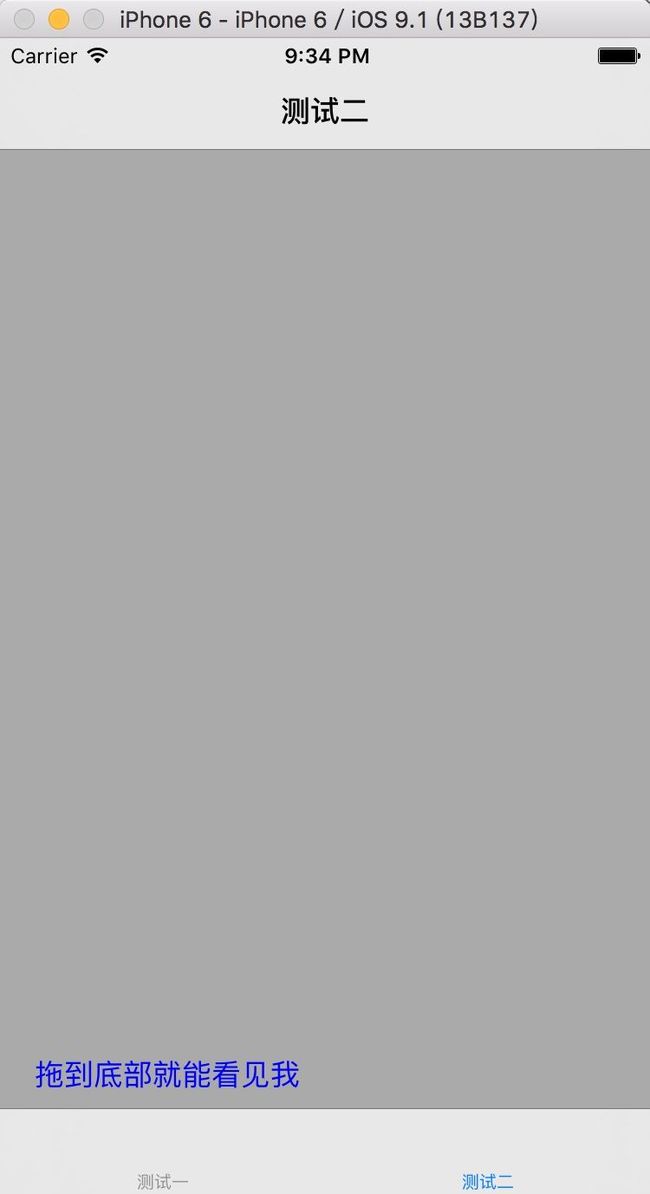IOS7屏幕适配
IOS7屏幕适配(一)
原因:IOS7之前的版本中UIViewController中的view在显示后会自动调整为去掉导航栏的高度的,控件会自动在导航栏以下摆放,IOS7之后所有的UIViewController创建后默认就是full Screen的,因此如果带导航栏的应用界面中的部分控件会被导航栏覆盖掉。
(一)第一部分
1、适配方法:创建category
#import "UIViewController+AddEdgesForExtendedLayout.h"
@implementation UIViewController (AddEdgesForExtendedLayout)
+(void)addEdgesForExtendedLayout:(UIViewController *)contoller {
#ifdef __IPHONE_7_0
if ([[UIDevice currentDevice].systemVersion floatValue] >= 7.0) {
if ([contoller respondsToSelector:@selector(setEdgesForExtendedLayout:)]) {
contoller.edgesForExtendedLayout = UIRectEdgeNone;
contoller.extendedLayoutIncludesOpaqueBars = NO;
contoller.automaticallyAdjustsScrollViewInsets = NO;
}
}
#endif
}
(二)第二部分(导航栏)
1、uiscrollview适配
本场景是在有uinavigationcontroller和uitabbarcontroller结合的ui框架中。
若整个view的子试图只有uiscrollview的话不需要适配view也能显示正常(我在IOS8、IOS9中测试通过,IOS7因为在xcode7中不支持所以未测试,不敢保证显示正确);若有其他的子视图则需要执行第一部分的方法,且uiscollview的定义要在-(void)viewWillAppear:(BOOL)animated中进行才会显示正常(原因可能是执行适配后view需要重新调整布局,uiscrollview要等到view重新布局完成后才能添加至view试图)。
//uiscrollview是唯一子视图
UIView *tempView = [[UIView alloc] initWithFrame:self.view.bounds];
[self.view addSubview:tempView];
UIScrollView *scroller = [[UIScrollView alloc] initWithFrame:self.view.bounds];
scroller.contentSize = CGSizeMake(self.view.bounds.size.width, self.view.bounds.size.height + 150);
UILabel *testLabel = [[UILabel alloc] initWithFrame:CGRectMake(20, self.view.bounds.size.height + 110, 200, 40)];
testLabel.text = @"拖到底部就能看见我";
testLabel.textColor = [UIColor blueColor];
scroller.backgroundColor = [UIColor lightGrayColor];
[scroller addSubview:testLabel];
[tempView addSubview:scroller];
//除了uiscrollview,还有其他子视图
//viewDidLoad函数中得代码内容
- (void)viewDidLoad {
[super viewDidLoad];
[UIViewController addEdgesForExtendedLayout:self];
self.view.backgroundColor = [UIColor lightGrayColor];
contentView = [[UIView alloc] initWithFrame:self.view.bounds];
[self.view addSubview:contentView];
UIView *topView = [[UIView alloc] initWithFrame:CGRectMake(0, 0, self.view.bounds.size.width, 100)];
topView.backgroundColor = [UIColor orangeColor];
[contentView addSubview:topView];
NSLog(@"%f",self.view.frame.size.height);
}
//viewWillAppear函数中的代码内容(定义uiscrollview)
-(void)viewWillAppear:(BOOL)animated {
[super viewWillAppear:animated];
if (!scroller) {
scroller = [[UIScrollView alloc] initWithFrame:CGRectMake(0, 100, self.view.bounds.size.width, self.view.bounds.size.height - 100)];
scroller.contentSize = CGSizeMake(self.view.bounds.size.width, self.view.bounds.size.height + 150);
UILabel *testLabel = [[UILabel alloc] initWithFrame:CGRectMake(20, self.view.bounds.size.height + 110, 200, 40)];
testLabel.textColor = [UIColor blueColor];
testLabel.text = @"sdgsdfgdf";
UILabel *testLabel1 = [[UILabel alloc] initWithFrame:CGRectMake(20, 0, 200, 40)];
testLabel1.textColor = [ UIColor blueColor];
testLabel1.text = @"sdgsdfgdf";
[scroller addSubview:testLabel1];
[scroller addSubview:testLabel];
[contentView addSubview:scroller];
}
NSLog(@"%f",scroller.frame.size.height);
}
下图就是在IOS9下view中只有uiscrollview一个子视图的情况。
2、uitableview适配
场景要有uinavigationbar,否则状态栏会覆盖一部分的内容(已在IOS8、IOS9下测试通过)。
//只有uitableview一个子视图
table = [[UITableView alloc] initWithFrame:self.view.bounds style:UITableViewStylePlain];
table.delegate = self;
table.dataSource = self;
table.bounces = NO;
[self.view addSubview:table];
//若有其他的试图,uitableview的定义须放在-(void)viewWillAppear:(BOOL)animated中才会显示正常:
[UIViewController addEdgesForExtendedLayout:self];//这句就是执行第一部分所说的方法(关键)
UIView *topView = [[UIView alloc] initWithFrame:CGRectMake(0, 0, self.view.bounds.size.width, 100)];
topView.backgroundColor = [UIColor greenColor];
[self.view addSubview:topView];
UIButton *btn = [[UIButton alloc] initWithFrame:CGRectMake(10, 20, 100, 30)];
[btn setTintColor:[UIColor blackColor]];
[btn setTitle:@"push" forState:UIControlStateNormal];
[btn addTarget:self action:@selector(pushNext) forControlEvents:UIControlEventTouchUpInside];
[topView addSubview:btn];
NSLog(@"%f",[[[UIDevice currentDevice] systemVersion] floatValue]);
NSLog(@"%f",table.frame.size.height);
-(void)viewWillAppear:(BOOL)animated {
[super viewWillAppear:animated];
table = [[UITableView alloc] initWithFrame:CGRectMake(0, 100, self.view.bounds.size.width, self.view.bounds.size.height - 100) style:UITableViewStylePlain];
//table = [[UITableView alloc] initWithFrame:self.view.bounds style:UITableViewStylePlain];
table.delegate = self;
table.dataSource = self;
table.bounces = NO;
[self.view addSubview:table];
NSLog(@"%f",table.frame.size.height);
}
(三)第三部分(重要)
1、uiscrollview、uitableview、uiwebview不需要设置self.edgesForExtendedLayout = UIRectEdgeNone。
2、其他的view,若导航栏透明需要设置self.edgesForExtendedLayout = UIRectEdgeNone等。
3、navigationBar设置成不透明, 要么你整个view 可以上下滚动. 要么设置 self.edgesForExtendedLayout = UIRectEdgeNone;. 要么把导航条设置不透明。
实例:
- (void)viewDidLoad {
[super viewDidLoad];
UIView *tempView = [[UIView alloc] initWithFrame:self.view.bounds];
scroller = [[UIScrollView alloc] initWithFrame:self.view.bounds];
[tempView addSubview:scroller];
UIView *contentView = [[UIView alloc] initWithFrame:CGRectMake(self.view.bounds.origin.x, self.view.bounds.origin.y, self.view.bounds.size.width, self.view.bounds.size.height + 200)];
scroller.contentSize = CGSizeMake(contentView.frame.size.width, contentView.frame.size.height);
[scroller addSubview:contentView];
UILabel *testLabel = [[UILabel alloc] initWithFrame:CGRectMake(0, contentView.frame.size.height - 40, contentView.frame.size.width, 40)];
testLabel.textColor = [UIColor redColor];
testLabel.text = @"shjdhjsg";
[contentView addSubview:testLabel];
UILabel *testLabel1 = [[UILabel alloc] initWithFrame:CGRectMake(0, 0, contentView.frame.size.width, 40)];
testLabel1.textColor = [UIColor redColor];
testLabel1.text = @"shjdhjsg";
[contentView addSubview:testLabel1];
NSLog(@"%f",self.view.frame.size.height);
[self.view addSubview:tempView];
}
ui布局在contentView。
